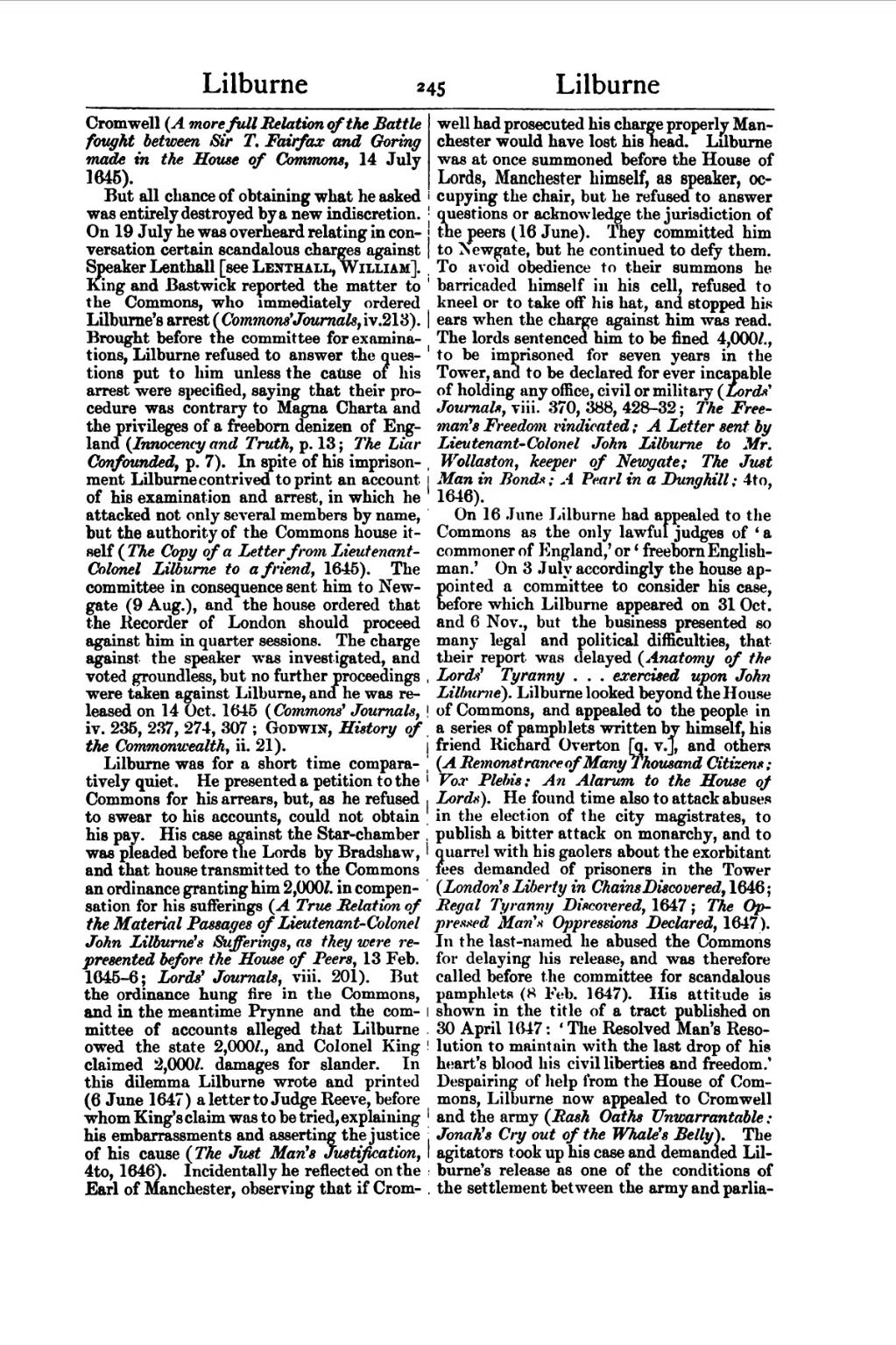Cromwell (A more full Relation of the Battle fought between Sir T. Fairfax and Goring made in the House of Commons, 14 July 1645).
But all chance of obtaining what he asked was entirely destroyed by a new indiscretion. On 19 July he was overheard relating in conversation certain scandalous charges against Speaker Lenthall [see Lenthall, William]. King and Bastwick reported the matter to the Commons, who immediately ordered Lilburne’s arrest (Commons’ Journals, iv. 213). Brought before the committee for examinations, Lilburne refused to answer the questions put to him unless the cause of his arrest were specified, saying that their procedure was contrary to Magna Charta and the privileges of a freeborn denizen of England (Innocency and Truth, p. 13; The Liar Confounded, p. 7). In spite of his imprisonment Lilburne contrived to print an account of his examination and arrest, in which he attacked not only several members by name, but the authority of the Commons house itself (The Copy of a Letter from Lieutenant-Colonel Lilburne to a friend, 1645). The committee in consequence sent him to Newgate (9 Aug.), and the house ordered that the Recorder of London should proceed against him in quarter sessions. The charge against the speaker was investigated, and voted groundless, but no further proceedings were taken against Lilburne, and he was released on 14 Oct. 1645 (Commons’ Journals, iv. 235, 237, 274, 307; Godwin, History of the Commonwealth, ii. 21).
Lilburne was for a short time comparatively quiet. He presented a petition to the Commons for his arrears, but, as he refused to swear to his accounts, could not obtain his pay. His case against the Star-chamber was pleaded before the Lords by Bradshaw, and that house transmitted to the Commons an ordinance granting him 2,000l. in compensation for his sufferings (A True Relation of the Material Passages of Lieutenant-Colonel John Lilburne’s Sufferings, as they were represented before the House of Peers, 13 Feb. 1645–6; Lords’ Journals, viii. 201). But the ordinance hung fire in the Commons, and in the meantime Prynne and the committee of accounts alleged that Lilburne owed the state 2,000l., and Colonel King claimed 2,000l. damages for slander. In this dilemma Lilburne wrote and printed (6 June 1647) a letter to Judge Reeve, before whom King’s claim was to be tried, explaining his embarrassments and asserting the justice of his cause (The Just Man’s Justification, 4to, 1646). Incidentally he reflected on the Earl of Manchester, observing that if Cromwell had prosecuted his charge properly Manchester would have lost his head. Lilburne was at once summoned before the House of Lords, Manchester himself, as speaker, occupying the chair, but he refused to answer questions or acknowledge the jurisdiction of the peers (16 June). They committed him to Newgate, but he continued to defy them. To avoid obedience to their summons he barricaded himself in his cell, refused to kneel or to take off his hat, and stopped his ears when the charge against him was read. The lords sentenced him to be fined 4,000l., to be imprisoned for seven years in the Tower, and to be declared for ever incapable of holding any office, civil or military (Lords’ Journals, viii. 370, 388, 428–32; The Freeman’s Freedom vindicated; A Letter sent by Lieutenant-Colonel John Lilburne to Mr. Wollaston, keeper of Newgate; The Just Man in Bonds; A Pearl in a Dunghill; 4to, 1646).
On 16 June Lilburne had appealed to the Commons as the only lawful judges of ‘a commoner of England,’ or ‘freeborn Englishman.’ On 3 July accordingly the house appointed a committee to consider his case, before which Lilburne appeared on 31 Oct. and 6 Nov., but the business presented so many legal and political difficulties, that their report was delayed (Anatomy of the Lords’ Tyranny … exercised upon John Lilburne). Lilburne looked beyond the House of Commons, and appealed to the people in a series of pamphlets written by himself, his friend Richard Overton [q. v.], and others (A Remonstrance of Many Thousand Citizens; Vox Plebis; An Alarum to the House of Lords). He found time also to attack abuses in the election of the city magistrates, to publish a bitter attack on monarchy, and to quarrel with his gaolers about the exorbitant fees demanded of prisoners in the Tower (London’s Liberty in Chains Discovered, 1646; Regal Tyranny Discovered, 1647; The Oppressed Man’s Oppressions Declared, 1647). In the last-named he abused the Commons for delaying his release, and was therefore called before the committee for scandalous pamphlets (8 Feb. 1647). His attitude is shown in the title of a tract published on 30 April 1647: ‘The Resolved Man’s Resolution to maintain with the last drop of his heart’s blood his civil liberties and freedom.’ Despairing of help from the House of Commons, Lilburne now appealed to Cromwell and the army (Rash Oaths Unwarrantable; Jonah’s Cry out of the Whale’s Belly). The agitators took up his case and demanded Lilburne’s release as one of the conditions of the settlement between the army and parlia-
